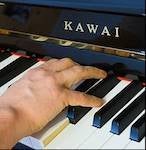 |
Welcome to the Piano World Piano Forums
Over 3 million posts about pianos, digital pianos, and all types of keyboard instruments.
Over 100,000 members from around the world.
Join the World's Largest Community of Piano Lovers
(it's free)
It's Fun to Play the Piano ... Please Pass It On!
|
|
|
|
57 members (Aleks_MG, accordeur, brdwyguy, Carey, AlkansBookcase, 20/20 Vision, 36251, benkeys, 9 invisible),
1,931
guests, and
319
robots. |
|
Key:
Admin,
Global Mod,
Mod
|
|
|
|
Joined: Jun 2009
Posts: 984
500 Post Club Member
|
OP

500 Post Club Member
Joined: Jun 2009
Posts: 984 |
So I found a Czerny sheet music on IMSLP that I was interested in, but it's barely legible (like fax quality). As it's only 2 pages and not very complicated ... I ended up typesetting my own version on Sibelius 😇 The notation style is not exactly the same but I'd say it's pretty decent. Another bonus is that you can put in your own fingerings (the ones in the original don't quite work for me).
Has anyone ever done this? In this case I think it's worth doing considering the legibility problem, but it may not be feasible for longer works. And there is always a risk of introducing errors in the copying process, although the piece is easy enough to proofread.
A rising tide lifts all the boats
|
|
|
|
|
Joined: Dec 2007
Posts: 19,678
Yikes! 10000 Post Club Member
|

Yikes! 10000 Post Club Member
Joined: Dec 2007
Posts: 19,678 |
Years ago. I had just taken a "music calligraphy" course through passed on notes, where the prof was a stickler about spacing, and I couldn't stand the spacing of the sheet I'd been handed from some unknown source. So I stopped practising and wrote it out: https://www.dropbox.com/s/u9m9c26cak9l7m7/tid2-myMedit.jpg?dl=0This was the original: https://www.dropbox.com/s/vnabm8bcuqoomeh/tid3-theirMedit.jpg?dl=0For example, in the first measure with notes, the half note takes up half the time in that measure but is squished into a quarter of the space. The prof suggested that proportions also give the musician reading the score a feel for timing, and this did seem to have an effect. Though my teacher at the time said that experienced musicians would not be that affected and besides, had to deal with some cr*ppy scores in their working lives.
|
|
|
|
|
Joined: Feb 2021
Posts: 478
Full Member
|

Full Member
Joined: Feb 2021
Posts: 478 |
When, I stop being lazy. I plan to rewrite all of Bach Inventions on another sheet.
I remember doing it when I was learning Prelude in C and it actually helped me understand the rhythm or the patterns much better in the piece, when you have to focus and write it down note for note there is definitely something there
This is also the same thing Bach did to Vivaldi concertos to learn how to compose.
Don't know why I don't see this recommended more, but I think it's a great exercise. I haven't tried it myself yet, but, I plan on doing it very soon.
My gods are: Cortot, Horowitz, and Sofronitsky,
Started piano during COVID, hopefully I can play Rachmaninoff, Rubinstein, and Scriabin compositions one day...
|
|
|
|
|
Joined: Aug 2006
Posts: 1,947
1000 Post Club Member
|

1000 Post Club Member
Joined: Aug 2006
Posts: 1,947 |
Yes, I did that with Sibelius and I can turn a two pages in a three pages sheet music to help my eyesight.
“To send light into the darkness of men’s hearts - such is the duty of the artist.”
- Robert Schumann
|
|
|
|
|
Joined: Apr 2008
Posts: 271
Full Member
|

Full Member
Joined: Apr 2008
Posts: 271 |
In a fit of demented megalomania and overreaching I used PrintMusic years ago to translate Scriabin's Op. 42 No. 5 into something I could actually read.
Went from 6 pages in the Dover edition I used as a source to 7 in my PDF. That, plus entering my fingerings, made it a lot easier to read. (Still impossible to *play* though... sigh...)
Jane - expert on nothing with opinions on everything
|
|
|
|
|
Joined: Jul 2012
Posts: 10,512
Yikes! 10000 Post Club Member
|

Yikes! 10000 Post Club Member
Joined: Jul 2012
Posts: 10,512 |
I done that with Mozart's 23rd, the intro which isn't written for solo piano. There is probably a good reason why, but I enjoyed doing it anyway to the best o' my capabilities on "Flat" internet notation.
Thing is, now I know it, I no longer need the music . . .
"I am not a man. I am a free number" " ![[Linked Image]](https://www.pianoworld.com/Uploads/files/Joplinbadgetiny.jpg) "
|
|
|
|
|
Joined: Sep 2017
Posts: 3,948
3000 Post Club Member
|

3000 Post Club Member
Joined: Sep 2017
Posts: 3,948 |
I used original scores for checking as well as re-copying. Once my music group featured a piano solo doing the Bach Keyboard Concerto #1 BWV 1056. My violin part had a few typos so I got hold of the Bach original (in his hand writing) for comparison. Bach's handwriting isn't bad compare to many doctor's handwriting.
The next is an orchestral piece by the French Composer Joseph Bologne (Chevalier de Saint-Georges) the opera overture "l'Amour Anonyme" in his hand writing. A recent piece I re-entered the notes into the computer was the violin parts for Vivaldi Concerto XI. I got a copy based on an old copy that was handwritten. Not easy to read and when you get to the end of the page, you have half a bar at the bottom of the page and the other half of a bar on top of the next page so the bar # gets a bit confusing.
Isn't hard to check for mistakes. You compare the total # bars to make sure you end up with the same total. I'd break the lines exactly the same as on the original so that it's easier to check for mistakes before adjusting the # bars on each line if necessary. And always do a playback a few times and compare with a sound recording online when available. Some of the time I would find mistakes in the original score than the other way around. I'd put a note on my copy stating that a mistake was found and corrected.
In my school days the computer software option wasn't available my music teacher made students copy music by hand (pen & paper).
|
|
|
|
|
Joined: Jun 2018
Posts: 3,262
3000 Post Club Member
|

3000 Post Club Member
Joined: Jun 2018
Posts: 3,262 |
So I found a Czerny sheet music on IMSLP that I was interested in, but it's barely legible (like fax quality). As it's only 2 pages and not very complicated ... I ended up typesetting my own version on Sibelius 😇 The notation style is not exactly the same but I'd say it's pretty decent. Another bonus is that you can put in your own fingerings (the ones in the original don't quite work for me).
Has anyone ever done this? In this case I think it's worth doing considering the legibility problem, but it may not be feasible for longer works. And there is always a risk of introducing errors in the copying process, although the piece is easy enough to proofread. I do this all the time. Literally. I use Musescore, and it is possible to let them convert a pdf into a musescore file, even though the results of that process range from almost perfect to useless. I am very particular in how I want my score to look, and I always change the fingering. I don't know though what I'll do once I start playing much longer pieces. I wish I knew somebody who does this as well, so we could exchange scores...
Playing the piano is learning to create, playfully and deeply seriously, our own music in the world.
*
... feeling like the pianist on the Titanic ...
|
|
|
|
|
Joined: May 2015
Posts: 12,370
PW Gold Subscriber Yikes! 10000 Post Club Member
|

PW Gold Subscriber Yikes! 10000 Post Club Member
Joined: May 2015
Posts: 12,370 |
I can understand this involved process for illegible scores, but I’m having a hard time seeing how it should be used on every score. The question I have is one of time versus benefit: yes, it may make the rhythm notation clearer, but don’t you give up the ability to pick up an unaltered score and just play it with the notation provided?
If you’re not in the habit of altering all scores, you can recognize how many beats a dotted quarter note takes and when the next note should be played even if the alignment is not perfect.
Maybe I’m misinterpreting this process or don’t recognize the value, since I just play the music ‘as is’.
The musical repertoire is so great that it would be difficult to find someone who would want to exchange scores— as your choices in music would just seldom overlap.
I hope someone will discuss with a little more detail.
|
|
|
|
|
Joined: Feb 2015
Posts: 4,033
4000 Post Club Member
|

4000 Post Club Member
Joined: Feb 2015
Posts: 4,033 |
I agree with dogperson. It's like learning to read different handwritings. Not everything is always going to be perfect. You should be able to read even badly notated music.
|
|
|
|
|
Joined: Oct 2010
Posts: 17,275
Yikes! 10000 Post Club Member
|

Yikes! 10000 Post Club Member
Joined: Oct 2010
Posts: 17,275 |
If you have a lot of time on your hands and have nothing better to do (like practising your scales & arpeggios  ), then re-writing perfectly legible printed music (I recommend by hand, like JSB) to suit yourself is fine. Personally, I'd spend the time writing my own original music - by hand, on manuscript paper, the way it's been done since time immemorial. As I can read what I write (though most people can't - it's on a par with Beethoven's in terms of legibility  ), I don't need electronic means. Actually, I don't have any electronic means of writing music, which is probably why all my music is perfectly playable (if you have the requisite technique), unlike some so-called composers who - because it's so quick & easy - chuck notes onto their computer screen which look impressive but are impossible to play or simply sound awful. But if they can't play themselves, it doesn't matter.......
If music be the food of love, play on!
|
|
|
|
|
Joined: Aug 2006
Posts: 1,947
1000 Post Club Member
|

1000 Post Club Member
Joined: Aug 2006
Posts: 1,947 |
Here's one I did. The original is from 1850, I added a missing measure and a few notes to make it more interesting. ![[Linked Image]](https://forum.pianoworld.com//gallery/42/full/15662.png)
“To send light into the darkness of men’s hearts - such is the duty of the artist.”
- Robert Schumann
|
|
|
|
|
Joined: Dec 2007
Posts: 19,678
Yikes! 10000 Post Club Member
|

Yikes! 10000 Post Club Member
Joined: Dec 2007
Posts: 19,678 |
Everything we do, it depends how, why, and to what purpose we do it. Anything can be a tool. Conversely, even a "good instruction" can become an empty ritual. So in terms of writing out music, random ideas:
- The time I wrote out the Meditation score that I linked, the act of doing so in the way I did it strengthened my awareness of time, meter, note value etc. A principle in pedagogy (I'm also a trained teacher), involving more senses strengthens learning. I'd come into formal learning after a lifetime of nothing but instinct, so things like timing were not well disciplined or precise. In the course I took, you tried to reflect the note value ratio in a measure. In 4/4 time, a half note took up half the space of the measure. A 5-tuplet lasting one beat, took up the space of 1/4 of the measure; two eighth notes took up the same space. A single whole note, in common sense, has a smaller measure rather than a wide space with one eensy circle in the middle. I found that after I did this exercise, my counting and timing in real time practice was stronger.
- Writing out passages might help you in one or the other way. If you have gained benefits, and benefits that are not a crutch, then you use it. In the classroom, people write notes. When we teach, we get students to do "reinforcing activities" and "learning activities" which should be part of any formal lesson plan. (esp. if during probation you are asked to produce one).
Writing out music because "you're supposed to", or "because Czerny asked the remote student to do so, therefore it's magic, is a dumb reason to do it.
- Personally, because of the way my musicking evolved, i.e. decades without a teacher and nothing taught in school, there are gaps and strange holes that I need to bridge. I can read music, but reading also evolved strangely. Sometimes when I play, I make sure to memorize part of the music, and then I stop mid-playing, look at my hands, and picture that note in the score, including register (my weak area). I may have a scribble-pad with me, and write out part of a passage, and also picturing the piano keys while doing so. It's my unique situation that got me to invent this. It would be stupid for someone else to do it, just because I do.
Whatever you do: why are you doing it, and what results is it giving you?
|
|
|
|
|
Joined: Nov 2007
Posts: 9,395
9000 Post Club Member
|

9000 Post Club Member
Joined: Nov 2007
Posts: 9,395 |
I engraved an Alkan nocturne in Finale, some years ago. The main reason was to get it onto four pages instead of six, so I could spread out the whole piece on my piano's music rack. I also engraved a Tagliapietra study, because the score I had was poor quality and too hard to read, and it had a typo or two that distracted me. I've engraved a few other things, for various reasons. Engraving is an interesting exercise, but can be time consuming. One thing it taught me is that there is a good deal in a score that I usually process fairly unconsciously, but engraving forces every little detail to be conscious.
Last edited by wr; 10/23/21 02:39 PM.
|
|
|
|
|
Joined: Sep 2017
Posts: 3,948
3000 Post Club Member
|

3000 Post Club Member
Joined: Sep 2017
Posts: 3,948 |
Here the difference between an old photocopy of an original copy and the redone version is night & day. You can still read the notes off the old copy but the new one looks much cleaner and the notes stand out more. If the old copy is in Vivaldi's handwriting, it is very neat but the new one is still more readable. ![[Linked Image]](https://forum.pianoworld.com//gallery/42/medium/15665.png)
|
|
|
|
|
Joined: Aug 2020
Posts: 93
Full Member
|

Full Member
Joined: Aug 2020
Posts: 93 |
Has anyone ever done this? Do you guys not have jobs? Kids? Lives? You have way too much free time 
|
|
|
|
|
Joined: Jun 2009
Posts: 984
500 Post Club Member
|
OP

500 Post Club Member
Joined: Jun 2009
Posts: 984 |
Has anyone ever done this? Do you guys not have jobs? Kids? Lives? You have way too much free time  Do you practice piano? Yes? Don't you have jobs? Kids? Lives? 😆
A rising tide lifts all the boats
|
|
|
|
|
Joined: Jun 2018
Posts: 3,262
3000 Post Club Member
|

3000 Post Club Member
Joined: Jun 2018
Posts: 3,262 |
Learning to play the piano as an older adult is hard enough as it is. When reading from a neat sheet of music with notes that are not too close nor too wide apart, fingering that is not crossed over and changed, makes it easier, then why not make it easier? You should be able to read even badly notated music. Why? I am not a professional, I just play for my own pleasure. And a tremendous pleasure it is!
Playing the piano is learning to create, playfully and deeply seriously, our own music in the world.
*
... feeling like the pianist on the Titanic ...
|
|
|
|
|
Joined: Feb 2015
Posts: 4,033
4000 Post Club Member
|

4000 Post Club Member
Joined: Feb 2015
Posts: 4,033 |
If you like doing it then do as you please. I like to read large amounts of music for fun and don't think it would be worth the effort to go through this process just to play a piece once or twice.
Also as you pointed out yourself when you start playing longer works it no longer becomes practical to reformat everything. Fortunately, for the more serious works like Mozart and Beethoven sonatas there are many high quality prints available.
About fingering, it's easy to cross out and change it with a pencil. Don't you ever do that? If you just want to change the fingering then I don't think it's worth the effort.
|
|
|
|
|
Joined: Jun 2018
Posts: 3,262
3000 Post Club Member
|

3000 Post Club Member
Joined: Jun 2018
Posts: 3,262 |
I like to read large amounts of music for fun and don't think it would be worth the effort to go through this process just to play a piece once or twice. I do short studies, and no, I would never copy the music to musescore if I only play a piece only for a couple of days! About fingering, it's easy to cross out and change it with a pencil. Don't you ever do that? If you just want to change the fingering then I don't think it's worth the effort. No, I don't print my scores, I use an iPad. Also as you pointed out yourself when you start playing longer works it no longer becomes practical to reformat everything. Fortunately, for the more serious works like Mozart and Beethoven sonatas there are many high quality prints available. Plus, many of those works are freely downloadable from Musescore, and then I can easily copy the notes into my preferred format. 
Playing the piano is learning to create, playfully and deeply seriously, our own music in the world.
*
... feeling like the pianist on the Titanic ...
|
|
|
|
Forums43
Topics223,392
Posts3,349,293
Members111,634
| |
Most Online15,252
Mar 21st, 2010
|
|
|
|
|
|
|








![[Linked Image]](https://www.pianoworld.com/Uploads/files/Joplinbadgetiny.jpg) "
" 


![[Linked Image]](https://forum.pianoworld.com//gallery/42/full/15662.png)
![[Linked Image]](https://forum.pianoworld.com//gallery/42/medium/15665.png)